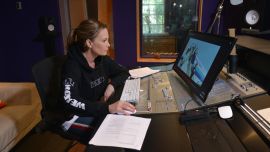When she moved to Buenos Aires from 9 de Julio to study Graphic Design, María Lobianco Ciado (21) chose the University del Salvador. But this year, with a $10,000 (US$ 222) monthly fee to pay, the cost of studying and living away from home forced a change of course: she enrolled in the public University of Buenos Aires (UBA)'s CBC entry examination to study Architecture.
"I felt helpless because the academic level is very intense and although many people think the CBC is a waste of time, in the first month I learned a lot", Lobianco Ciado said.
The number of students enrolling in the Common Basic Cycle (CBC) to access courses at the UBA hit record levels in 2019.
CBC classes, which began in early April, had a total of 61,700 new enrolments — 3,000 more than last year and 10,000 more than in 2017 when 53,000 students attempted to pass the one-year entry programme to the country's most prestigious learning institution.
Authorities at the UBA explained that the phenomenon is not only tied to its national and international prestige but that it also reflects the migration of students from private to public institutions.
In the context of Argentina's current economic crisis, students in the private system cannot afford to pay their monthly fees. In an effort to stop the flow, private universities have launched a series of payment plans — and even loans.
"We see the biggest movement of students form the private to public system in the degrees of Economics and Design", Jorge Ferronato, director of the CBC, told this journalist in an interview.
He emphasised the need to support new students: this year, the CBC financed the purchase of 1,600 new chairs and opened several new venues, like the Moreno Regional Central and another in the Lugano neighbourhood, which has been fully operational since the beginning of the academic year.
But the decision to switch is not easy: Leandro Videla (28) completed his first year of Economics at the Argentine Business University (UADE) in 2018 and he knew that in order to continue studying this year he needed some $19,000 to cover his enrolment costs and regular monthly fees.
"What was stopping me from moving to the public system was that in a private university you usually have the same classmates, but in the UBA it's rare for you to experience that", he said. Videla is now taking night courses at the CBS's Paternal office.
For Sophie Condina (20), who was enrolled at the Catholic University of Argentina, the move to the public system was because of the "unsustainable" bills associated with her degree. She arrived to Buenos Aires from Caleta Olivia, in Santa Cruz province, last year, to study International Relations.
"Education is an investment", Condina said. However, she had to abandon private education since "I couldn't even afford, among other costs, the $300 it costs for lunch each day".
She started History this semester at the UBA, where she said she is still "adapting".
"I did not have a good secondary education and the CBC is useful because it creates a balance among students in terms of their knowledge", she explained.
REFINANCING THE CRISIS
Private universities have begun implementing financial programmes to stop students dropping out of their programmes.
One such programme is UADE Te Acompaña (UADE Accompanies You), which was created this year to address the difficulties facing students.
Mercedes Núñez, head of admissions, said that "of the 500 students who accessed the programme, 11 percent joined because of issues surrounding payment". The university reports a 30 percent drop-out rate among the the 6,500 enrollments it has per year.
Drop-outs are also rising at the University del Salvador, where 200 students left this year compared to the 150 last year. USAL is offering scholarships of up to 75 percent to ease financial pains for students. Of a total 25,000 students, 6,000 pay partial fees.
At the Catholic University, students can access loans set at the interest rate of Banco Nación. The amount of the loans varies from 25 to 85 percent of the total annual cost of a study programme. Students must have average grades of 7.5 or more.
This article originally appeared in Spanish on Perfil.com























Comments